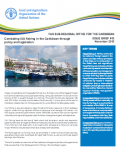Illegal, Unreported and Unregulated (IUU) fishing represents one of the largest threats to sustainable fishing and marine biodiversity and hinders the Caribbean region's efforts to conserve and manage fish stocks, according to an issue brief on the topic by the Food and Agriculture Organization of the UN's (FAO) Sub-Regional Office for the Caribbean.
 18 January 2016: Illegal, Unreported and Unregulated (IUU) fishing represents one of the largest threats to sustainable fishing and marine biodiversity and hinders the Caribbean region’s efforts to conserve and manage fish stocks, according to an issue brief on the topic by the Food and Agriculture Organization of the UN’s (FAO) Sub-Regional Office for the Caribbean.
18 January 2016: Illegal, Unreported and Unregulated (IUU) fishing represents one of the largest threats to sustainable fishing and marine biodiversity and hinders the Caribbean region’s efforts to conserve and manage fish stocks, according to an issue brief on the topic by the Food and Agriculture Organization of the UN’s (FAO) Sub-Regional Office for the Caribbean.
Titled ‘Combatting IUU fishing in the Caribbean through policy and legislation,’ the brief describes the negative impacts of IUU fishing on the Caribbean region and provides an overview of the international and national agreements to tackle IUU fishing, ranging from the UN Convention on the Law of the Sea (UNCLOS) and the UN Fish Stocks Agreement (FSA) to the International Plan of Action to Prevent, Deter and Eliminate IUU Fishing (IPOA-IUU).
IUU fishing negatively affects environmental protection and food security, the issue brief stresses. It explains that failure to address IUU fishing could contribute to the collapse of a fishery or impair efforts to rebuild already-depleted stocks. The brief also highlights how IUU fishing results in lost economic and social opportunities. It estimates IUU fishing costs the global fishing industry US$10-23 billion annually and results in lost income and livelihoods for legitimate fishers.
Despite increasing commitments to address IUU fishing, progress in implementing fisheries agreements remains limited in the Caribbean region, according to the brief. It explains that the development of fisheries legal frameworks has been slow, with “many years” passing before Caribbean governments adopt relevant laws and regulations.
According to the document, one country that has made efforts to tackle IUU fishing is Saint Kitts and Nevis, which is a party to the UN Port State Measures Agreement and the UN FSA and has signed a National Plan of Action (NPOA) to deter and eliminate IUU Fishing. The government is collaborating with FAO to train government agencies in port state measures and to develop a Fisheries, Aquaculture and Marine Resources Bill and relevant regulations, which will help the country to implement the requirements of the Port State Measures Agreement.
The brief also describes efforts to address IUU by the Caribbean Regional Fisheries Mechanism (CRFM), the Western Central Atlantic Fishery Commission (WECAFC), the Caribbean Community Common Fisheries Policy (CCCFP), and the European Union (EU) Council Regulation No 1005/2008. The brief then provides an overview of five key international fisheries instruments to combat IUU fishing. [FAO Press Release] [Publication: Combatting IUU Fishing in the Caribbean through Policy and Legislation]